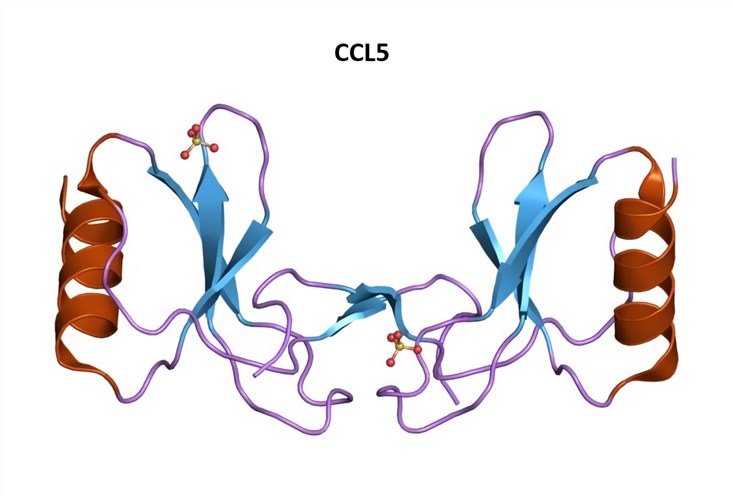NASH Target Development Service for CCL5
Chemokines are significant determinants in the occurrence and outcome of hepatic disease, including non-alcoholic steatohepatitis (NASH). CCL5 may promote infiltration of cells into the liver during chronic and acute liver injury, thus the disease can be slowed by inhibiting this chemokine. As a specialist in the market of drug development, Creative Biolabs can provide comprehensive solutions and high-quality small molecular drug discovery, screening, and optimization services for CCL5 antagonists. As such, we can produce the most ideal chemokine antagonist for specific requests and make it a new therapeutic candidate for NASH diseases.
Introduction of CCL5
CCL5 (C-C motif chemokine ligand 5), also known as SIS-Delta, small inducible cytokine A5 (RANTES), and T-cell specific protein P288 (TCP228), is a 68-amino-acid protein and belongs to the C-C subfamily. It is a potent chemoattractant for eosinophils, monocytes, basophils, effector memory T cells (CD4⁺/CD45RO⁺), B cells, natural killer (NK) cells, and immature dendritic cells. This chemokine plays a critical role in recruiting leukocytes into inflammatory sites, and also, mainly participates in inflammatory diseases and some cancers. With the help of specific cytokines (IL-2, IFN-γ) released by T cells, CCL5 is able to induce the proliferation and activation of certain NK cells to form C-C chemokine-activated killer cells. CCL5 serves as a ligand for the receptor CCR5. The binding of them can competitively inhibit HIV-1 binding and entry into cells.
 Fig.1 Structure of CCL5. Distributed under Open Access License CC BY-SA 4.0, from Wiki, without modification.
Fig.1 Structure of CCL5. Distributed under Open Access License CC BY-SA 4.0, from Wiki, without modification.
The Role of CCL5 in NASH
NASH is thought to be the progressive form of nonalcoholic fatty liver disease (NAFLD), which is characterized by inflammation, liver steatosis, hepatocellular injury and different degrees of fibrosis. A central issue in this field is the identification of factors that trigger inflammation, thus provoking the transition from non-alcoholic fatty liver to NASH.
The chemokine exerts a key part in the development of hepatic inflammation and subsequent wound healing activities, which leads to resolution or maladaptive responses with chronic inflammation, tissue scarring (fibrosis), and development of clinically liver disease. Hence, chemokines are determinants in the pathogenesis of hepatic diseases. CCL5 may promote infiltration of NK cells into the liver during liver injury via interaction with CCR1 expressed on NK cells. CCR5 present on NK cells regulates trafficking into areas of parasitic infection in the liver and spleen, without which hosts can’t clear the infection. NK cell homing to the red pulp of spleen during inflammation or cytomegalovirus infection is dependent on the synergistic action of CCR5 and CXCR3. Based on the expression of CCR5 and CXCR3 respectively, CCL5 and CXCL10 expressed by keratinocytes attract a subset of CD56⁺, CD16⁻, CD158b⁻ NK cells to psoriatic skin lesions.
CCL5 Antagonist Developments at Creative Biolabs
Currently, treatment guidelines support the notion of prevention and preemptive management of NASH by controlling modifiable metabolism and other risk factors. To date, drug agents for therapeutics are investigative and experimental. A majority of potentially effective drugs should be used in the clinical trials and extreme caution is warranted in using these tested drugs without proper supervision.
In order to increase pharmacy safety and open newly curative sight, Creative Biolabs has dedicated to small molecule drug development and built mature therapeutic antibody platforms to accomplish various challenging project objectives. Notably, we can offer unique CCL5 antagonists for hindering the leading progressive liver injury and facilitating a more cost-effective treatment of patients with NASH. In addition, we also support integrated chemokine antagonist development projects from global clients and provide high-quality small molecule agents against other inhibitor targets as required.
As a well-recognized professor in the disease target development, Creative Biolabs has a strong sense of purpose and deep scientific understanding of diseases, guiding us to reach clients’ goals with low risk and accelerated timelines. And we can do more than listed relied on advanced platforms, for instance, Phage Display & Antibody Library Services, Antibody Analysis Services, Antibody Engineering Services, and so many. If you’re interested in any service, please feel free to contact us.
 For Research Use Only.
For Research Use Only.